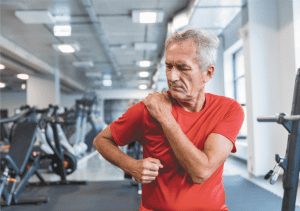By Dr. James M. Ray and Dr. Valerie Sorge
 Joint pain from arthritis can be acute or chronic, large or small joints in location, nociceptive or neuropathic, but the underlying origin is inflammation. Our body”s mediators of inflammation include cytokines, neuropeptides, growth factors and neurotransmitters. Inflammation happens in everyone. Our immune system creates inflammation to protect the body from infection, injury, and disease. Our body uses the inflammation process to heal those areas in need of physiologic mending.
Joint pain from arthritis can be acute or chronic, large or small joints in location, nociceptive or neuropathic, but the underlying origin is inflammation. Our body”s mediators of inflammation include cytokines, neuropeptides, growth factors and neurotransmitters. Inflammation happens in everyone. Our immune system creates inflammation to protect the body from infection, injury, and disease. Our body uses the inflammation process to heal those areas in need of physiologic mending.
Inflammation is a normal action of our body’s immune response. Acute inflammation occurs for a short duration. Symptoms appear quickly and restores body function to its pre-injury state. Chronic inflammation is associated with autoimmune disorders and causes more severe effects. Autoimmune diseases, include rheumatoid arthritis and inflammatory bowel disease, In these cases our immune system attacks healthy cells. The post-COVID joint inflammation sequelae has fast become a major orthopedic problem. Diagnosis and treatment of atypical joint manifestations from COVID-19 are similar to rheumatic diseases requiring special treatment. Post-COVID symptoms include arthralgia and myalgia pains that are common in viral diseases.
The most common orthopedic problems after being sick with coronavirus are shoulder and back problems. People post COVID-19 become less active. Inactivity causes aches and pains, stiffness and muscle weakness. Muscle weakness leads to difficulties with activities such as standing, walking, climbing stairs, getting in and out of a chair, exercising, and lifting. This fatigue and malaise is attributed to immune consumption.
Synovial joints, such as the hip and knee, have a sheath of tissue known as a joint capsule that contains a synovium. The synovium is connective tissue that lines the inside of the joint capsule. The synovium is a specific membrane which produces synovial fluid to lubricate the joint. Injuries which cause the development of osteoarthritis and various types of rheumatic inflammatory arthritis can cause swelling of the synovium. The inflammation of the synovium causes pain, excessive fluid production and limited function. Synovitis is the term used for synovial inflammation.
In active people the most common cause of synovitis is overuse. Athletes or people whose jobs involve repetitive movement or joint stress may develop synovitis. People with an autoimmune process may have symptoms consistent with inflammatory arthritis. Excessive growth of the synovium is part of an abnormal autoimmune response. The chief symptom is arthralgia, or joint pain. The pain of synovitis is usually more severe than expected based on the appearance of the joint. In other words, there may be no visible evidence of injury causing pain.
It is well understood that orthopedic surgeons are not on the frontline in managing a majority of these patients who have joint inflammatory problems; however, the orthopedist’s expertise becomes pertinent when patients have orthopedic afflictions, even post Covid. Treatment for synovitis usually consists of rest and anti-inflammatory medications. Medications may include oral drugs known as DMARDs (disease-modifying antirheumatic drugs) and, in some cases, steroid injections. Patients who don’t respond to these treatments may be referred to an orthopedic surgeon to discuss surgical procedures such as a synovectomy, a procedure in which much of the synovium is removed, or in severe cases total joint replacement.
Recurrent episodes of joint acute inflammation can also lead to a chronic inflammatory response. The quality of life becomes affected and these symptoms must be addressed. There are injectable treatments for the management of acute or chronic synovitis from major joint inflammation caused by severe arthritic change. One of the early injectable treatments was from synthetic hyaluronic acid derivatives, given intra-articular, weekly for 3-5 weeks, and may last 6-9 months, at which time the series can be repeated. Platelet rich plasma (PRP) is an autologous preparation from the patient’s own blood, which when prepared, can be injected into the afflicted joint. PRP can be mixed with other injectable materials such as vitamin B, lidocaine, allograft stem cells (exosomes, amniotic fluid, Wharton’s jelly), and ozone. Combination therapies may offer the best results. Arthritis is a process that can not be cured. The goal of treatment is to reduce symptoms to allow joint comfort with function.
Come visit us at Vidaful Medicine and see which treatment will be best to help you combat harmful joint inflammation. This aggressive management will provide pain relief from synovitis and possibly save you from dealing with more serious joint health issues.
To find out more, or to schedule your appointment, please call 239.920.7676 or visit www.vidaful.com.
Vidaful Medicine
7955 Airport-Pulling Rd, Suite 101
Naples, FL 34109










